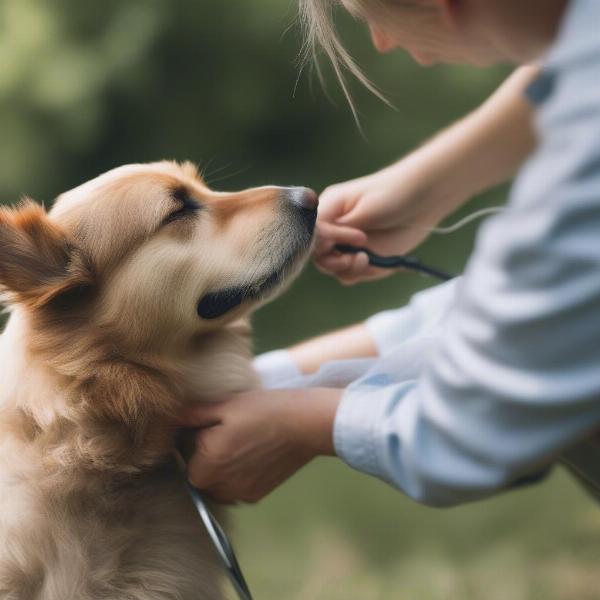Head lice are a common nuisance for humans, especially children. But can our canine companions also suffer from these tiny parasites? The simple answer is no. Dogs cannot carry or transmit human head lice. While dogs can get their own types of lice, these species are specific to dogs and cannot infest humans. So, if you’ve noticed your child scratching their head and wondered if the family dog is to blame, you can rest assured – they’re not the culprit. This article will explore the differences between human and dog lice, why dogs can’t get head lice, and what parasites dogs can get.
Why Can’t Dogs Get Human Head Lice?
Human head lice ( Pediculus humanus capitis) are highly specialized parasites. They have evolved to thrive specifically on human blood and are adapted to the specific environment of the human scalp. Their claws are perfectly designed to grip human hair, and they are unable to effectively grasp the thicker, coarser hair of dogs. Similarly, dog lice are adapted to the unique characteristics of dog fur. They cannot survive on human blood or attach to human hair. Think of it like a lock and key – each species of louse has its own specific “key” that only works on one particular “lock” (host).
Different Species, Different Hosts
Just as humans have their specific type of lice, dogs also have their own. The most common louse found on dogs is Trichodectes canis, also known as the biting louse. This louse feeds on skin debris and can cause intense itching and irritation. Another type of louse that can infest dogs is Linognathus setosus, the sucking louse, which feeds directly on blood. Both of these lice are species-specific, meaning they can only infest dogs.
What Parasites Can Dogs Get?
While dogs can’t get head lice, they are susceptible to a variety of other parasites, including:
- Fleas: These are the most common external parasites affecting dogs. They cause itching, irritation, and can even transmit diseases.
- Ticks: These blood-sucking parasites can transmit a range of serious illnesses to dogs, including Lyme disease and Rocky Mountain spotted fever.
- Mites: Different types of mites can infest dogs, causing skin problems like mange.
- Intestinal worms: These internal parasites can cause digestive problems and other health issues.
It’s important to regularly check your dog for these parasites and use preventative treatments as recommended by your veterinarian. dog friendly holiday accommodation north wales
Signs of Parasites in Dogs
If your dog is experiencing any of the following symptoms, it could be a sign of a parasitic infestation:
- Excessive scratching or licking
- Hair loss
- Skin redness or irritation
- Scabs or lesions
- Restlessness
- Weight loss (in cases of severe infestations)
 Dog Being Checked for Ticks
Dog Being Checked for Ticks
Preventing Parasites in Dogs
Prevention is always better than cure when it comes to parasites. Here are some steps you can take to protect your dog:
- Regularly use preventative medications: Your veterinarian can recommend appropriate flea, tick, and heartworm preventatives.
- Groom your dog regularly: Brushing your dog’s fur can help you detect parasites early on.
- Keep your environment clean: Regularly vacuum your home and wash your dog’s bedding to reduce flea and tick populations.
Conclusion
So, can dogs carry head lice? The answer is a definitive no. While it’s natural to be concerned about parasites, it’s important to remember that human head lice are species-specific and cannot infest dogs. However, dogs can get other parasites, and regular preventative care is crucial for maintaining their health and well-being. dog friendly holidays cumbria
FAQ
- Can I get lice from my dog? No, you cannot get head lice from your dog. Dog lice are species-specific and cannot infest humans.
- Can my dog get lice from another dog? Yes, dogs can get lice from other dogs through direct contact.
- What should I do if I think my dog has lice? Contact your veterinarian. They can diagnose the infestation and recommend appropriate treatment.
- Are dog lice dangerous? While generally not life-threatening, dog lice can cause discomfort and skin irritation. Severe infestations can lead to anemia.
- Can I use human lice treatment on my dog? No, never use human lice treatment on your dog. These products can be toxic to animals. Always consult your veterinarian for appropriate treatment options. macon dog park
- How can I prevent my dog from getting lice? Regular preventative medications, grooming, and a clean environment can help prevent lice infestations.
- What are the signs of lice in dogs? Excessive scratching, hair loss, skin redness, and restlessness can be signs of lice.
ILM Dog is a leading international online resource dedicated to providing dog owners with reliable, practical information on all aspects of dog care and wellbeing. From breed selection and health to training, nutrition, and grooming, ILM Dog offers expert advice and resources to help you provide the best possible care for your canine companion. Whether you are a new dog owner or a seasoned expert, ILM Dog has something for you. squirrel hunting with a dog We offer a range of services including detailed breed guides, health advice, training tips, and product reviews. Contact us at [email protected] or +44 20-3965-8624 to learn more. Visit ILM Dog today!